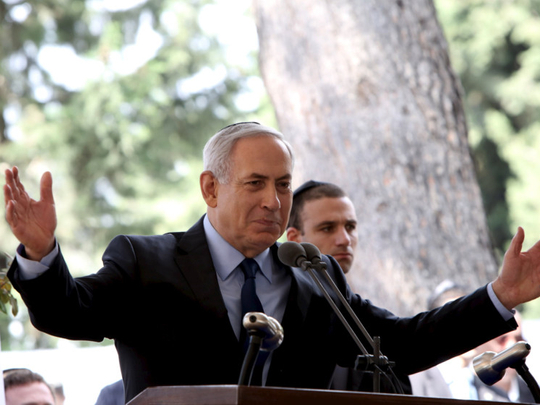
Washington: Israeli Prime Minister Benjamin Netanyahu visited Washington on Monday seeking to build on the already broad and deep security relationship, hopeful that US President Barack Obama will want to demonstrate his commitment to the Israeli regime after the Iran deal.
Recently, Gen. Joseph Dunford, chairman of the Joint Chiefs of Staff, visited Israel and met with Netanyahu, and Israeli Defence Minister Moshe Ya’alon visited Washington.
The current memorandum of understanding (MOU) on military aid doesn’t run out until fiscal year 2018, but Netanyahu wants to lock in some key elements for the next decade. Those include improved missile defence, smaller-diameter bombs that could be dropped on targets while minimising civilian casualties, and F-35 fighter planes, which are stealthier than those the Israeli regime currently has, says Loren Thompson, chief operating officer of the Lexington Institute and former professor of strategic studies at Georgetown University.
The talks on security take place in the shadow of anxiety in the US Congress over the Iran deal and whether to impose new sanctions for its conduct outside of the nuclear accord. The US administration realises new sanctions could undercut the nuclear accord if Iran believes it will gain nothing from the deal.
Netanyahu and Obama will probably talk about sanctions as well as other ways — including interdiction — to respond to Iranian aid to groups such as Hezbollah and Hamas. On Friday, the Treasury Department announced sanctions on two individuals and four companies it said were buying military technology, including electronics, engines, communications and unmanned aerial vehicles, for Hezbollah.
Sources close to both governments say that the Obama administration will urge Netanyahu to restrain from stirring up Congress.
Though they have sharply differing views on how to handle the current geopolitics of the Middle East and a history of sour relations, Obama and Netanyahu both are looking to set a course for the last year of the Obama presidency.
The leaders plan to discuss how to counter Iranian aid to Hezbollah and Hamas and the Russian and Iranian efforts to prop up Syrian President Bashar Al Assad.
The most tangible piece of the agenda, however, is a 10-year memorandum of understanding (MOU) on military cooperation between the two countries that would budget aid and lock in a plan for new weaponry.
The two leaders are being propelled by different forces. By reaffirming support for the Israeli regime’s security, Obama is seeking to reassure Democrats who reluctantly backed the Iran deal despite their strong support for the Israeli regime and misgivings about the nature of the Iranian regime.
On the American side, there is a sense of limited ambition that contrasts sharply with the hopes Obama outlined six years ago in a speech in Cairo, where he spelled out ways in which Israelis and Palestinians could move beyond mutual blame and take steps toward peace.
The Israeli regime, he said then, should “live up to its obligation to ensure that Palestinians can live and work and develop their society”. He added: “Just as it devastates Palestinian families, the continuing humanitarian crisis in Gaza does not serve Israel’s security ... Progress in the daily lives of the Palestinian people must be a critical part of a road to peace, and Israel must take concrete steps to enable such progress.”
Many Middle East experts say that Obama was naive about Israeli willingness to take those steps and about his own ability to bridge long-standing and deeply felt animosities.
But Obama no longer harbours hope for a peace agreement or even renewed talks during his presidency, the result of a “major reassessment”, administration officials said in a conference call with journalists on Thursday. Instead, he is searching for ways to keep alive the idea of a two-state solution when much of Netanyahu’s cabinet opposes it and when continued colony expansion threatens to make it unworkable.
“Clearly, part of our assessment has been that we don’t see a clear pathway right now to the type of negotiations that could produce a two-state solution, as much as we would like that to be the case,” said Ben Rhodes, deputy national security adviser.
Obama will be asking Netanyahu to lay out some steps, after Palestinian National Authority leader Mahmoud Abbas in his speech to the UN General Assembly declared that his people would no longer be bound by the Oslo Peace Accords.
“There will not be a comprehensive final status agreement in the remainder of his term, and there likely may not even be meaningful negotiations between the two sides,” said Robert Malley, Middle East coordinator at the National Security Council.
— Washington Post












